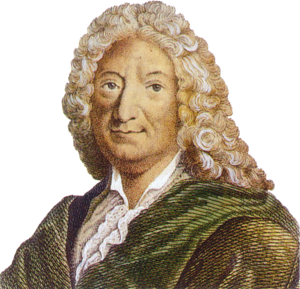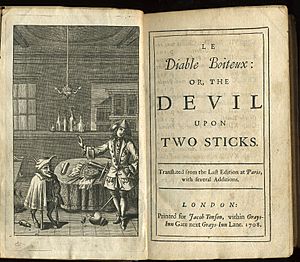Alain-René Lesage facts for kids
Quick facts for kids
Alain-René Lesage
|
|
|---|---|
 |
|
| Born | 6 May 1668 Sarzeau, Brittany, France |
| Died | 17 November 1747 (aged 79) Boulogne-sur-Mer, Picardy, France |
| Occupation | Novelist, playwright |
| Nationality | French |
| Period | Enlightenment |
Alain-René Lesage (born May 6, 1668 – died November 17, 1747) was a famous French writer. He wrote many novels and plays. People know him best for his funny novel The Devil upon Two Sticks. He also wrote the play Turcaret and the adventure novel Gil Blas.
Contents
Life Story
Early Years and School
Alain-René Lesage was born in Sarzeau, France. His father, Claude Lesage, was a lawyer and court official. His mother was Jeanne Brenugat. Sadly, both of Lesage's parents died when he was very young.
He was then cared for by his uncle. But his uncle did not manage his money or his education well. A kind Jesuit priest named Père Bochard helped him. Père Bochard was the head of a college in Vannes. He saw Lesage's talent and helped him learn about literature.
At age 25, Lesage moved to Paris in 1693. He wanted to continue his studies there.
Starting His Writing Career
In 1694, Lesage married Marie Elizabeth Huyard. She was beautiful but had no money. Lesage was not yet a successful writer. Around this time, he met an old school friend, Antoine Danchet. Danchet was a playwright and told Lesage to try writing.
Lesage started by translating books. In 1695, he translated some letters by Aristaenetus. This book was not very popular. Soon after, he met a helpful friend, the Abbé de Lyonne. The Abbé gave him money each year. He also told Lesage to study Spanish literature. Spanish books were popular in France a long time ago. But people had forgotten them by Lesage's time.
Lesage began translating plays from Spanish writers. These included plays by Francisco de Rojas Zorrilla and Lope de Vega. Some of his early translated plays were Le Traître puni and Don Félix de Mendoce. In 1704, he translated a part of Don Quixote. He also changed a play by Pedro Calderón de la Barca. This play, Don César Ursin, was liked by the court but not by the public.
Lesage was almost 40 before he became truly successful. In 1707, his short play Crispin rival de son maître was very popular. Also, his novel Le Diable boiteux was published. It sold many copies. Lesage later made changes to this novel in 1725.
Even with these successes, actors did not like Lesage. They refused to perform his short play Les Étrennes. So, he changed it into Turcaret in 1709. Many people think Turcaret is his best play.
Writing Novels and Plays
It took some years before Lesage wrote another novel. The first two parts of Gil Blas de Santillane came out in 1715. It was not as popular as Le Diable boiteux at first. Lesage worked on Gil Blas for a long time. The third part came out in 1724, and the last part in 1735.
During these 20 years, he was always busy. Even though Turcaret and Crispin were great, the main French theater did not want him. So, in 1715, he started writing for the Théâtre de la foire. This was a comic opera performed in booths at festivals. He wrote about 100 pieces for them. These ranged from songs to short plays with music.
He also wrote many novels. Besides finishing Gil Blas, he translated Orlando innamorato. He also rewrote Guzman d'Alfarache. He wrote two original novels, Le Bachelier de Salamanque and Estevanille Gonzalez. In 1732, he wrote Les avantures de monsieur Robert Chevalier. This book was about a pirate in New France. It was similar to books by Daniel Defoe. Lesage also wrote La Valise trouvée, a collection of made-up letters.
Later Life and Retirement
Lesage stopped working in 1740, when he was over 70 years old. He and his wife moved to live with their second son. This son was a church official in Boulogne-sur-Mer.
Lesage's oldest son, Louis-André, became an actor. Lesage was very upset by this at first. He had often written about actors in a funny or bad way. His son used the stage name Montménil. He became a very good actor and was well-liked in Paris. Many years later, Lesage and his son made up. Lesage became very close to Montménil.
Montménil died in 1743 after catching a cold. This was a very sad event for Lesage. After this, he left Paris and stopped writing. Lesage's youngest son also became an actor. He used the name Pittenec. So, Lesage and his wife spent their old age with their second son. This son was a Canon in Boulogne. He had a good income thanks to the queen.
Alain-René Lesage lived to be over 80 years old. He became very deaf and had to use an ear trumpet. But his conversations were still wonderful. When he visited his favorite coffee house in Paris, people would gather around him. They would climb on tables and chairs just to hear his wise and witty words.
Alain-René Lesage died on November 17, 1747.
Personality
We don't know much about Lesage's daily life. But the stories we have show he was a very independent person. He did not like to rely on rich people for money.
One story tells how a Duchess asked him to read his play at her home. This was a common thing for writers to do. The reading was set for noon. But Lesage was busy with a court case and arrived an hour late. When he tried to say sorry, the Duchess was very cold. She said he made her guests wait an hour. Lesage quickly replied, "It's easy to fix that, madam. I won't read my play, and you will gain two hours." Then he left and never went back to her house.
Famous Sayings
- "Pride and conceit were the original sins of man."
- "Facts are stubborn things."
Works
Translations and adaptations
- Le Traître puni, 1700
- Don Félix de Mendoce, 1700
- Point d'honneur, 1702 (French version)
- Second Book of the Ingenious Knight Don Quixote of La Mancha, 1704
- Orlando innamorato, 1721
- Guzman d'Alfarache, 1732 (French version)
Plays
- Don César Ursin, 1707 (French version)
- Les Étrennes, 1707
- Crispin rival de son maître, 1707 (French version)
- Turcaret, 1709
- Arlequin roi de Serendib, 1713
- La Foire de Guibray, 1714
- Arlequin Mahomet, 1714
- La Statue merveilleuse (fair play, with d'Orneval), 1720 (French version)
- La Boîte de Pandore 1721, comedy in 1 act.
Novels
- Le Diable boiteux, 1707. (French version) (tr. The Devil upon Two Sticks, The Devil on Two Sticks; English version)
- Gil Blas (English version, French)
- Histoire de Gil Blas de Santillane, (Livres I–VI), 1715. (French version)
- Histoire de Gil Blas de Santillane, (Livres VII–IX), 1724. (French version)
- Histoire de Gil Blas de Santillane, (Livres X–XII), 1735. (French version)
- Histoire de Gil Blas de Santillane, 1747.
- Les avantures de monsieur Robert Chevalier, dit de Beauchêne, capitaine de flibustiers dans la Nouvelle-France, 1732 (French version)
- Le Bachelier de Salamanque, 1736. (French version)
- Estevanille Gonzalez, 1732* Alain-René Lesage at Standard Ebooks* La Valise trouvée, 1740 (French version)
- Mélange amusant de saillies d'esprit et de traits historiques les plus frappants, 1743
See also
 In Spanish: Alain-René Lesage para niños
In Spanish: Alain-René Lesage para niños
 | Audre Lorde |
 | John Berry Meachum |
 | Ferdinand Lee Barnett |


